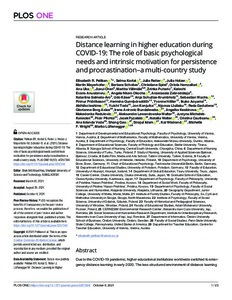Distance learning in higher education during COVID-19: The role of basic psychological needs and intrinsic motivation for persistence and procrastination–a multi-country study
Pelikan Elisabeth R.; Korlat Selma; Reiter Julia; Holzer Julia; Mayerhofer Martin; Schober Barbara; Spiel Christiane; HamzallariOriola; Uka Ana; Chen Jiarui; Välimäki; Maritta; Puharić Zrinka; Anusionwu Kelechi Evans; Okocha Angela Nkem; Zabrodskaja Anastassia; Salmela-Aro Katariina; Käser Udo; Schultze-Krumbholz Anja; Wachs Sebastian; Friðriksson Finnur; Gunnþórsdóttir Hermína; Höller Yvonne; Aoyama Ikuko; Ieshima Akihiko; Toda Yuichi; Konjufca Jon; Llullaku Njomza; Gedutienė Reda; Axisa Glorianne Borg; Bundalevska Irena Avirovic; Keskinova Angelka; Radulovic Makedonka; Lewandowska-Walter Aleksandra; MichałekKwiecień Justyna; Plichta Piotr; Pyżalski Jacek; Walter Natalia; Cautisanu Cristina; Voda Ana Iolanda; Gao Shang; Islam Sirajul; Wistrand Kai; Wright Michelle F.; Lüftenegger Marko
https://urn.fi/URN:NBN:fi-fe2021120158338
Tiivistelmä
Due to the COVID-19 pandemic, higher educational institutions worldwide switched to emergency distance learning in early 2020. The less structured environment of distance learning forced students to regulate their learning and motivation more independently. According to self-determination theory (SDT), satisfaction of the three basic psychological needs for autonomy, competence and social relatedness affects intrinsic motivation, which in turn relates to more active or passive learning behavior. As the social context plays a major role for basic need satisfaction, distance learning may impair basic need satisfaction and thus intrinsic motivation and learning behavior. The aim of this study was to investigate the relationship between basic need satisfaction and procrastination and persistence in the context of emergency distance learning during the COVID-19 pandemic in a cross-sectional study. We also investigated the mediating role of intrinsic motivation in this relationship. Furthermore, to test the universal importance of SDT for intrinsic motivation and learning behavior under these circumstances in different countries, we collected data in Europe, Asia and North America. A total of N = 15,462 participants from Albania, Austria, China, Croatia, Estonia, Finland, Germany, Iceland, Japan, Kosovo, Lithuania, Poland, Malta, North Macedonia, Romania, Sweden, and the US answered questions regarding perceived competence, autonomy, social relatedness, intrinsic motivation, procrastination, persistence, and sociodemographic background. Our results support SDT’s claim of universality regarding the relation between basic psychological need fulfilment, intrinsic motivation, procrastination, and persistence. However, whereas perceived competence had the highest direct effect on procrastination and persistence, social relatedness was mainly influential via intrinsic motivation.
Kokoelmat
- Rinnakkaistallenteet [27094]
